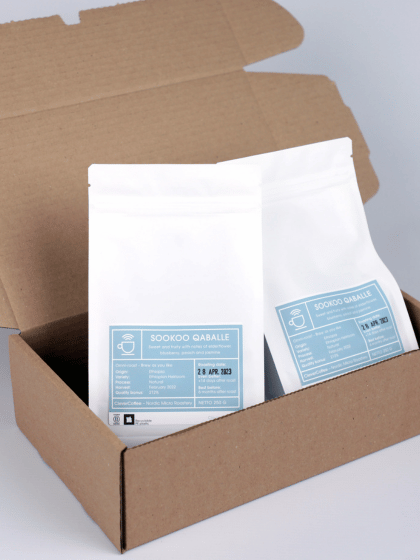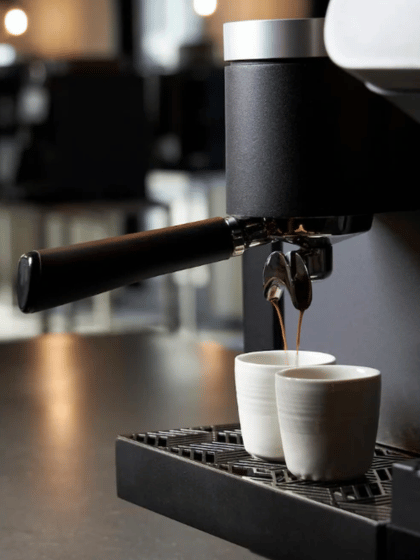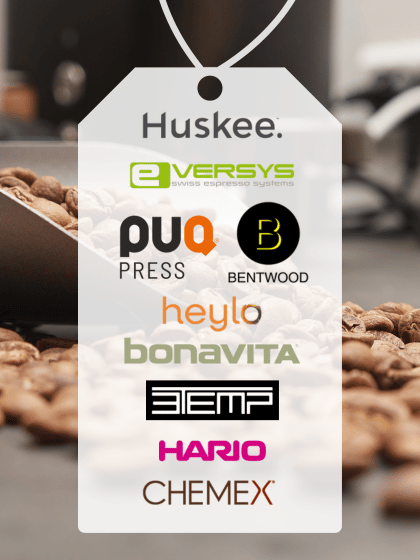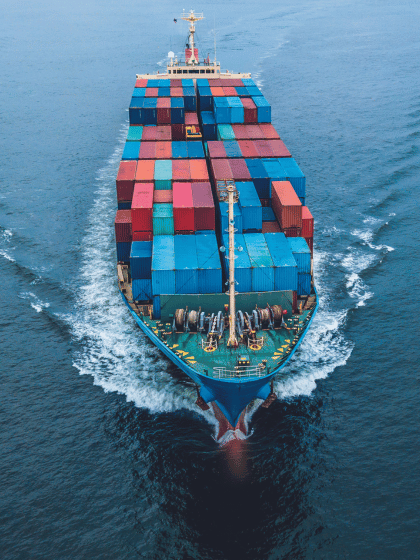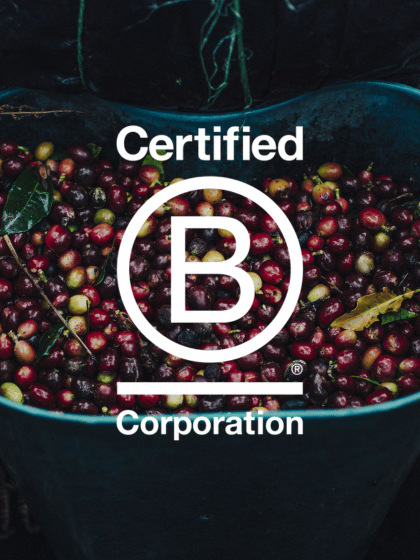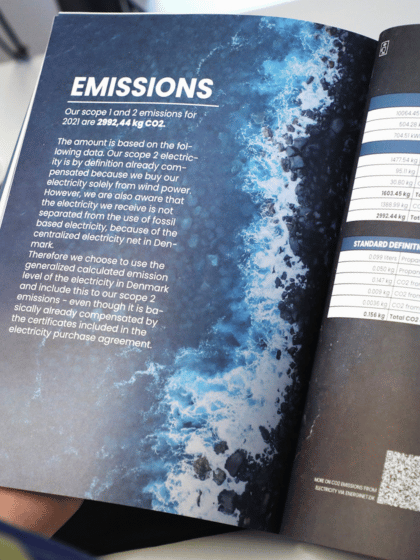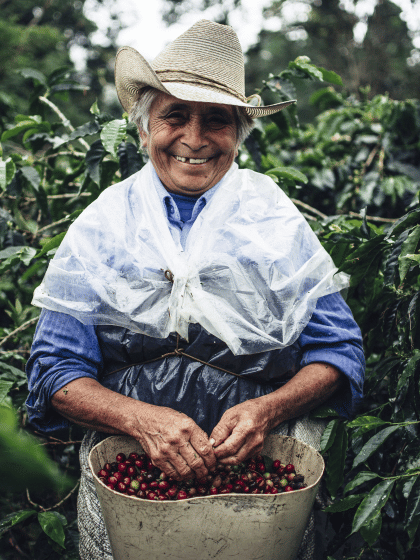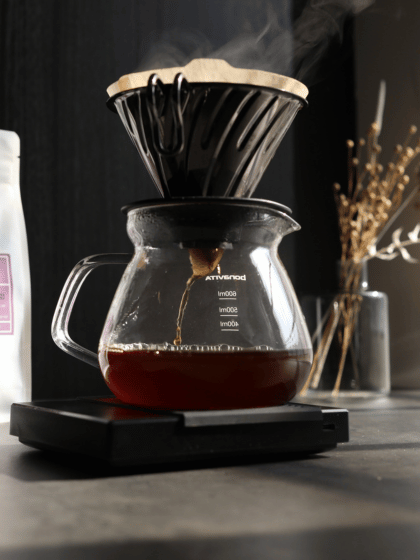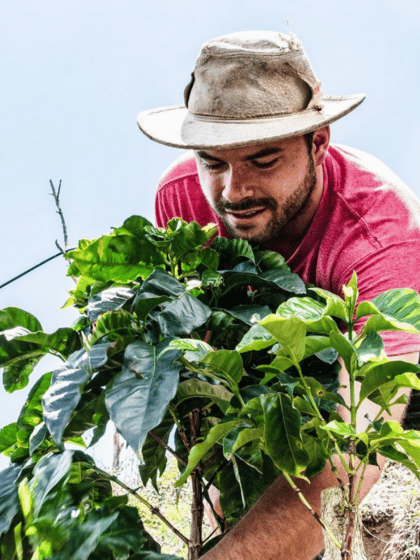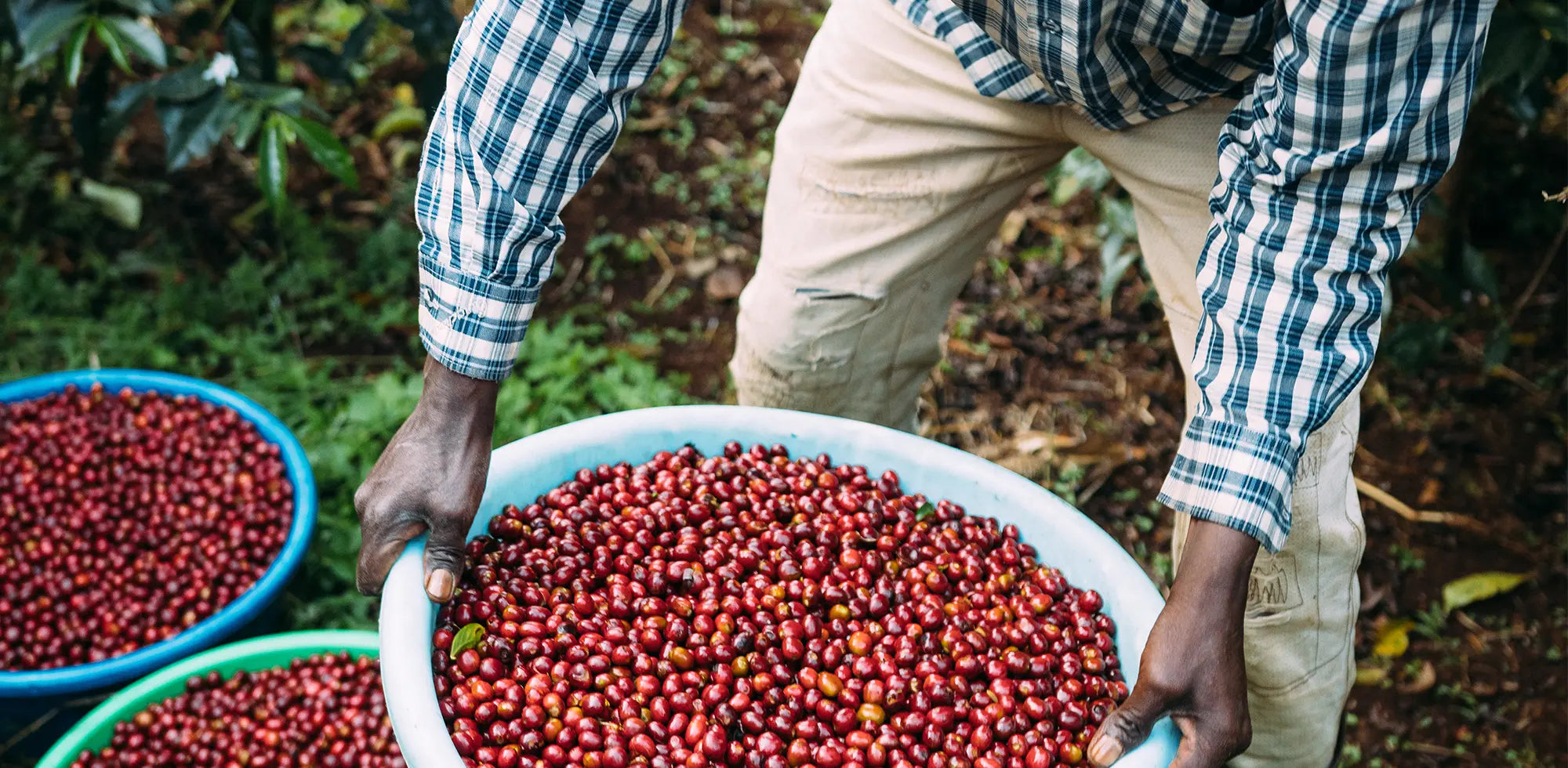FAQ
Orders and subscriptions
We endeavor to send all orders no later than the following business day after your order has been placed. In the event that this cannot be done, you will be contacted by us. You will also be notified when your shipment is on its way.
We ship via PostNord, and the expected delivery time is 1-2 working days. During peak seasons or around public holidays, there may be short delays. If your item is not in stock, the delivery time may be extended.
If you want to return a product, it is decisive which product type you have purchased. In the case of roasted coffee beans, we unfortunately cannot offer returns, regardless of whether the seal is broken or not.
If you have another product that you want to return, simply contact us here and we will find a solution. ATTENTION! On e.g. cleaning products or paper filters, it is important that the seal is not broken.
Your subscription can be paused at any time, and there are no fees for pausing or resuming.
You received an email during the creation of your subscription with a link to your subscription overview. To pause your subscription for a single month, you simply go in and skip the next delivery in your subscription overview, where you manage your subscription.
You can also find your subscription overview on the home page of your CleverCoffee user if you have created one.
If you want to pause the subscription for a longer period of time, you can write to us and we will help you pause it for the period of time you want.
If there's anything teasing or you have any questions, please contact us!
By default, we ship all subscriptions on the first Wednesday of each month.
ATTENTION! When a new subscription is taken out, the coffee is sent immediately – unless the subscription is ordered on or after the 25th of a given month. When ordering on or after the 25th, you will receive your first delivery of coffee subscription at the same time as everyone else - i.e. on the first Wednesday of the following month.
However, you can contact us at support@clevercoffee.dk if you wish to receive a shipment of the current month's coffee.
Read more about coffee subscriptions here .
If you order the coffee before the 25th of a given month, you will receive your coffee subscription for the current month. So if you order the coffee on 15 March, you will receive the coffee a few days later.
If you order the coffee on or after the 25th of a given month, you will only receive the coffee for the next month. So if you order on 25 March, you will receive your coffee subscription delivery on the first Wednesday in April.
If you want the coffee from the current month, when you order after the 25th, you can send us an email at support@clevercoffee.dk and ask if we have more in stock.
You can cancel your subscription at any time.
You have received an email in connection with the creation of your subscription. In the email there is a link which gives access to your subscription overview. Here you can cancel your subscription.
You can also access your subscription overview on the website from your CleverCoffee user if you have created one.
Filter coffee and espresso brewing
Water is one of the most important and unfortunately also the most overlooked variables in coffee brewing. Water plays a big role in the taste of the coffee and the health and lifespan of your equipment, so we recommend that you use filtered water.
For filter coffee, we recommend water with a total hardness between 25 and 100 ppm. It gives the most transparency and sweetness in the taste. Our water in the roastery has a total hardness of approx. 45 ppm.
For espresso brewing, we recommend water with a total hardness between 60 and 125 ppm. It provides the most balance and protects your equipment from lime deposits.
Getting good brewing water at home can be challenging. The best solution is to have a water filter installed directly on the water connection either directly to a machine or to an external outlet. The water filter will protect your equipment, and you will experience significantly improved taste in the coffee.
If it is not possible to install a water filter in your home, we recommend the following:
- Buying soft and filtered bottled mineral water (eg Nornir from REMA1000)
- Filtering tap water with a BWT Aqualizer filter jug
- Buying demineralized water (intended for drinking) and mixing in Third-Wave-Water bags
Another solution could be to ask your local café if it is possible to buy brewing water from them. It is not always possible, as it is often time-consuming for the company, but it can be a good and sustainable solution. Remember your own container and don't expect a yes.
All our coffee beans are 'omni-roasted'. This means that they are roasted in a very specific way, which makes them suitable for both filter coffee and espresso.
So which beans to choose depends on what flavor profile you're looking for.
Our Impact series is roasted slightly darker than our other coffees. They are therefore recommended if you want a rich taste with sweet and pleasant notes such as chocolate, nuts, vanilla etc. We call the Impact series 'crowd pleasers' because you can proudly serve them to everyone. Some prefer the Impact series for espresso drinks with milk, as the fullness plays well against the frothy milk in, for example, a flat white or cappuccino.
All our other coffees - the ones we call 'premium' coffees - vary more in flavor profiles. This is where the coffee as a taste experience really unfolds. Here you can expect a little more acid and often fruit notes - but always in a sensible balance. We publish a new premium coffee every month, so here you have the opportunity to continuously discover new coffees from all over the world.
There are many myths about the best way to store coffee beans so that they retain their flavor and aroma - however, many of them are a little creative and there is no tangible evidence that it actually works.
In general, coffee beans should ideally be stored in a dark, dry and cool place. Therefore, the refrigerator is not a good place, as it is often damp. A kitchen cupboard can be a fine place, as long as it e.g. is not over a stove or kettle. Find a place where there is as little moisture, light and heat as possible.
It is very common for people to pour coffee into another container when they receive it. However, we recommend that you store our beans in the bag you receive them in. In the bag, there is a one-way valve that ensures that the air can leak out when the beans degas. The zip of the bag is airtight and slows down the oxidation process, so the beans are kept fresh and full of flavor for weeks.
Our basic recipe for espresso is 20g of coffee to 40g of brewed espresso in 28 seconds. We keep the amount of coffee constant, while the amount of espresso brewed is a variable that we change depending on the coffee we brew with. We aim for a brewing time of 25-30 seconds regardless of the recipe.
We adjust the amount of espresso brewed to reach the best balance, but you can start by following this rule of thumb:
- For coffees with high transparency and aromatic intensity, we aim for a larger amount of brewed espresso, e.g. 50-60g.
- For coffees with high sweetness and a lot of body, we aim for a smaller amount of brewed espresso, e.g. 40-50g.
We recommend that you brew with 20g of coffee in the filter basket, as it provides a more forgiving brew, more even extraction and a better balance in taste.
There are many filter baskets in different sizes for espresso, and it can be difficult to figure out which one to use. We find that when you brew with 20g of coffee in a 20g precision filter basket from IMS, you get the absolute best and most even extraction with the vast majority of machines and grinders - that is why it is also the model that we use in all our espresso machines.
If you want a different size of filter basket, we also recommend IMS precision filter baskets in sizes 15g, 18g and 22g.
We do NOT recommend using very small filter baskets, such as a 7g singleshot filter basket. For filter baskets below 15g, grind so fine that it leads to a less even extraction.
Sustainability and responsibility
We currently have one CO2-neutral coffee in our range. It's called Impact No. 01 and was launched at the beginning of 2023. The coffee is CO2-neutral according to the NetZero standard, and became so in collaboration with the cooperative SanCoffee and the coffee farm Santa Clara in Brazil. NetZero means that we have reduced the coffee's emissions by more than 90% before compensating for the last emissions.
We have a wish that over time we can get more CO2-neutral coffees, but it requires a huge amount of work for the individual coffee farmers to calculate and minimize their CO2 footprint, which is both time-consuming and expensive. However, better payment for coffee can help enable more coffee farmers to be able to afford to invest in it.
The number of organic coffees in our range changes continuously, depending on which coffees are in season and which coffees we have chosen to buy. If a coffee is certified organic, it will always be clearly marked on the product page.
However, as a permanent part of our range, we have the coffee Impact No. 02. It is certified organic, meaning grown without the use of synthetic fertilizers or pesticides, grown in forests for maximum biodiversity and traded directly with the farmer-owned cooperative Cafesmo in Honduras. It is always a good choice for an organic, responsible and sustainable coffee.
We are often asked if our coffee is Fairtrade or why it is not? The truth is that our coffee is not Fairtrade because it is not ambitious enough.
Fairtrade must help ensure a better and more stable income for the world's coffee farmers through a minimum price. Unfortunately, the price they guarantee is still far too low and, moreover, it costs money for the coffee farmer to become Fairtrade certified.
At CleverCoffee, we also want to create a better life for coffee farmers, and give them the means to invest in their production themselves. We do this by paying a price that is far higher than Fairtrade's minimum price. Instead of setting a fixed minimum price, our price is determined based on the coffee farmer's costs and the quality of the coffee beans. In this way, we ensure that the coffee farmer is paid fairly.
We would also like certifications like Fairtrade to be ambitious and credible, but unfortunately you can't count on the coffee farmer to get an income he can live on with a Fairtrade label on the bag.
If you are more curious, in our Transparency Report 2022 you can find all the coffees we bought in 2022 and what we paid for them.
It can be incredibly difficult to define sustainability, and thus which coffees are or are not sustainable. At CleverCoffee, we focus on the social and environmental responsibility of our products, i.e. that the product can continue to be produced in a responsible manner.
That is why we enter into collaborations that best serve the environment and the coffee farmer's interests. This can be by minimizing the coffee farm's CO2 footprint, minimizing water consumption in processing or by growing the coffee in the forest and thereby increasing biodiversity.
In addition, we pay significantly more for the coffee, which helps to improve living conditions among coffee farmers. It also gives them more money to invest in improving both quality and sustainability. And we publish what we pay!
In the roastery, we work to minimize our production's impact on the climate. Eg. by using an extremely energy-efficient coffee roaster that uses approximately 80% less energy than our old coffee roasters, and by packing the coffee in mono-material bags that can be sorted as waste as plastic.
In everything we do, we try to find the most responsible solutions. That's why we believe that yes - if you buy coffee from us, you buy some of the most responsible coffee on the market and help make a difference for coffee farmers and the environment.
Certified B Corporations are companies that use business to make a positive impact on the world. They care about their employees, the environment and their impact on the world. And they don't just act with words, they put action behind the words.
Being a B Corp (Certified B Corporation) means that a company is officially certified by the independent nonprofit organization B Lab, which evaluates companies' social and environmental performance in addition to their financial success. To achieve this certification, the company must meet strict standards of social responsibility, environmental sustainability and transparency.
The Net-Zero Standard is a tool for companies, countries or other groups aiming to achieve net-zero greenhouse gas emissions. The standard is a response to the urgent need to create a common reference for how we should go about reducing our emissions and how we can best compensate for them.
The Net-Zero Standard consists of a series of guidelines drawn up by more than 1,200 experts from more than 100 different countries.
In order to meet the corporate goals for Net-Zero 2050, the following must be achieved:
- A reduction of more than 90% of the company's Scope 3 emissions of greenhouse gases before 2050
- Compensation for the remaining emissions of greenhouse gases, so that "NetZero emissions" are achieved.
Our coffee Impact No. 01 meets the requirements of the Net-Zero Standard for a CO2-neutral coffee, as we have reduced our emissions by more than 90% and then compensated for the remaining emissions.
Equipment
Home brewing can seem very complex, but in reality you only need good coffee, good water, a quality grinder and a scale.
In this article, we describe in more detail what we think you need to brew world-class filter coffee at home: Link to article
Coffee beans
Is this the first time you buy coffee from us? Then you can try our 'Taster's Pack', which represents a wide range of our range - then you can taste different coffees and find out what you like.
- If you like fruity and juicy coffees, we recommend that you try coffees from Kenya - they have juicy and often berry-like expressions. Eg. Top Mutitu
- If you like floral coffees, we recommend you try coffees from Ethiopia - they are floral, light and transparent in taste. Eg. Sookoo Qabale
- If you are into more round and "balanced" coffees, we recommend that you try coffees from Central or South America. Although there is a great diversity of flavors in Central and South America, they often have a more round and balanced expression than African coffees.
- If you want to try something more experimental, we recommend that you try coffee with a "natural" or "anaerobic" process. They have more characteristic expressions than you find in other coffees. It could, for example, be El Desafio or El Cristobal.
The coffee farmers we work with have fine-tuned their production to the environment they are in. Production methods vary from region to region, but overall the process is the same.
The coffee bean is the seed from the red cherry-like "coffee berry". After the coffee berry is harvested, it can generally be processed in two different ways.
The first method is called a washed process. Here, the berry is run through a machine that mechanically removes the pulp. The beans are then washed to dissolve the thin layer of sugar that sits tightly around the berry. Finally, the bean is left to dry to achieve the right water content and thus the best possible stability and taste.
The second method is called a "natural" process. Here, the whole berry is left to dry, so that the pulp dries completely, while the bean achieves the right water content, stability and taste. After drying, the dried berry is removed from the bean.
The beans are then ready to be packed and sent off to the coffee roaster, who roasts the coffee and sells the coffee to the consumer.
How long coffee beans can keep their good taste and aroma depends on many different factors. Are they stored dry and cool? Are they dark or light roasted? Does the bag close completely every time? Are the beans from Ethiopia or Costa Rica?
With our coffee, we find that the beans taste best between 2 and 8 weeks after the roasting date. However, we recommend that you drink the coffee during the first two weeks after the bag has been opened.
Every year we publish a Transparency Report, which gives our customers the opportunity to fully dive into our work with the farmers, in the roastery and with our customers.

